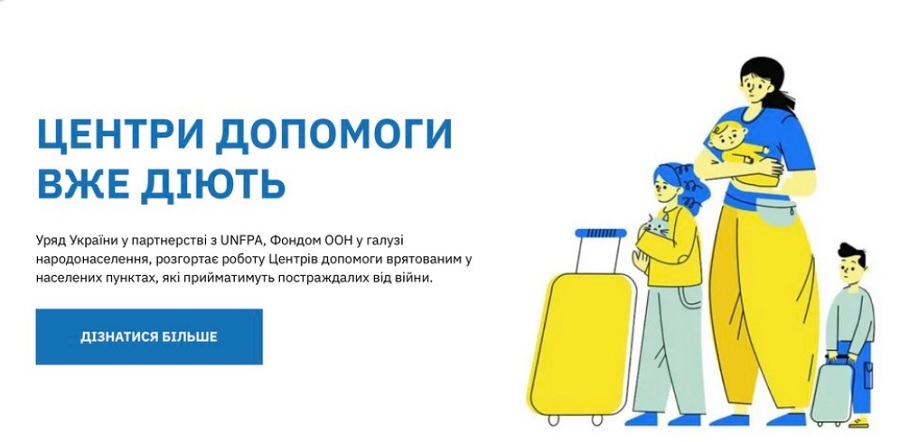Doing business

Office of the Deputy Prime Minister for European and Euro-Atlantic Integration and the Office of the Government Commissioner for Gender Policy presented a new online platform to help survivors. This is the first online platform in Ukraine to provide comprehensive information on all key services to help war victims. The platform will make it easier and faster for citizens to contact the service they need.
“Since the beginning of russia’s full-scale invasion, millions of Ukrainians have felt the consequences of this brutal war and need comprehensive support – social, humanitarian, legal, and psychological. Having found themselves in relative safety, they feel confused and often simply do not know how and where to seek free professional assistance. The Platform for Assistance to Rescued Persons should make it easier for them to access proven services and initiatives,” said Olha Stefanishyna, Deputy Prime Minister for European and Euro-Atlantic Integration.
The platform currently contains all the key services that provide psychological, legal and social assistance to Ukrainians. In addition, the site offers booklets and information materials to help citizens to recognize the negative consequences of violence and deal with them in time.
“Unfortunately, the consequences of the war are unprecedented for Ukrainians. It is impossible to estimate the time and resources we will need to eliminate them. That is why it is so important to combine the efforts of the state, civil society, and international organizations. Thanks to our coordinated work with our partners, this mission is becoming real,” commented Kateryna Levchenko, Government Commissioner for Gender Policy in Ukraine.
All the initiatives on the platform are designed to provide support to Ukrainians in any part of the country, as well as abroad. All services are verified, confidential, and free of charge. At the same time, the list presented on the platform is not exhaustive, and therefore, other services and organizations can also join it if they wish.
“For a long time, UNFPA, the United Nations Population Fund in Ukraine and the team of the Deputy Prime Minister for European and Euro-Atlantic Integration of Ukraine have been working closely together to support services that help people in the most difficult life circumstances. The Assistance Platform is a website that collects contacts of key support services for victims of various types of violence. The platform complements other similar initiatives that we have created and continue to develop, such as Aurora and Survivor Assistance Centres. We are confident that the platform will help people access information in a simple and timely manner, as well as provide practical advice on where to seek help,” said Mustafa Elkanzi, Senior Emergency Coordinator, UNFPA Deputy Representative in Ukraine.
The platform is designed not only for the victims but also for the professionals who provide assistance to them. The site already contains recommendations and guidelines for working with victims in accordance with the best international standards.
“The platform will allow us to reach a much wider range of people affected by the war with social support. It will help social workers identify people in need of assistance due to the consequences of the war, provide them with the necessary support and properly guide them further to fully ensure the rights and interests of people,” said Uliana Tokareva, Deputy Minister of Social Policy of Ukraine.
Another task of the platform is to create an environment of trust between victims and service providers. This is important because comprehensive professional support is the first step in achieving justice. Having received the necessary assistance, victims may be ready to turn to law enforcement agencies to bring their perpetrators to justice in the future.
“National Police investigators document about 95% of all war crimes. Among the tens of thousands of cases of cynical violations of the laws and customs of war are cases of sexual violence, which the occupiers use as a weapon against the civilian population. Since the first months of the war, police officers in specialized mobile teams have been recording sexual crimes in the de-occupied territories of Kyiv, Chernihiv, Sumy, Kharkiv, Mykolaiv, Donetsk and Kherson regions. We understand that it is difficult to document such crimes due to the high level of latency, and victims need comprehensive assistance to avoid retraumatization,” said Kateryna Pavlichenko, Deputy Minister of Internal Affairs of Ukraine.
“Being there for citizens and providing them with reliable, comprehensive support is the main goal of the medical system and all our doctors. We have adapted our work to the challenges of wartime and the demands of society, and have oriented the functioning of all our institutions to provide medical and psychological assistance to each and every person who has suffered torture and violence. We coordinate our work with other ministries, NGOs and international partners to respond as quickly and effectively as possible to the new challenges that arise every day in the context of war. Our task and responsibility are to help Ukrainians preserve and strengthen their psychological resources. If we restore a person, a person will restore everything,” said Deputy Minister of Health of Ukraine Iryna Mykychak.
In the future, the online platform will be scaled up and improved. The nearest plans include additional sections with services for children’s development and education. The platform will also provide access to initiatives that help Ukrainians find new jobs, retrain and increase their economic potential.
The link to the Survivor Assistance Platform is here: www.help-platform.in.ua
Background
The Platform for Assistance to Rescued Persons was created at the initiative of the Office of the Deputy Prime Minister for European and Euro-Atlantic Integration and with the support of the Government Commissioner for Gender Policy and the UNFPA ( United Nations Population Fund) in Ukraine.
Source: www.kmu.gov.ua